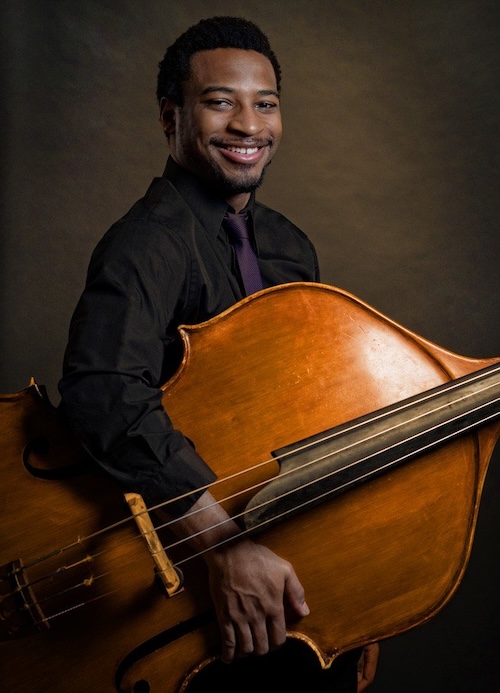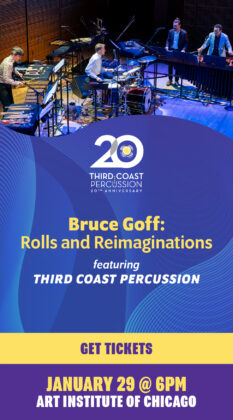Sinfonietta marks MLK Day with a joyous musical celebration

The Chicago Sinfonietta upheld one of its integral annual customs despite Sunday’s frigid temperatures, presenting its Martin Luther King Jr. Tribute Concert at Wentz Concert Hall in Naperville. In keeping with tradition, the matinee program centered on works by black American composers, this year featuring works by Scott Joplin, Xavier Foley, and Margaret Bonds.
Sinfonietta music director Mei-Ann Chen offered her ebullient advocacy both in extolling the works’ virtue and through her dedicated, enthusiastic conducting—none more so than in Xavier Foley’s “Victory” Concerto for contrabass, heard here in its Chicagoland debut.
Composer-bassist Foley has made a strong favorable first impression on Chicago audiences with a spate of memorable solo outings in recent seasons, and his prolific output as both performer and composer places him on track to becoming a household name. In this program, the Avery Fisher Career Grant and Sphinx Competition winner reasserted his composer bona fides as the soloist in his own work, which Foley premiered last year with Santa Fe Pro Musica and Chen as conductor.
The Victory concerto tears out of the gate at a brisk clip, introducing the syncopated motive that serves as the work’s motto. From there, it proceeds in one movement without pause, departing intermittently from its driving central theme to take extended detours into sunnier, Afro-Cuban-inflected stylistic locales.
The work is a marvel on its own—knitting together daredevil virtuosity with melodic earworms set against an economical yet effective string orchestra setting.
The music feels inextricable from the brawny yet exacting instrumental delivery of its composer-soloist. Foley’s warm sound and penetrating musicality sailed through the work’s dizzying arabesques and spiraling melodies, and the contrabassist maintained effortless intonation throughout from the daring heights of the instrument’s upper fingerboard. Chen and her band, for their part, delivered intuitive companionship to their soloist, creating a balanced and lithe sound to complement the contrabass’ amber-hued tone.
The program opened with the Overture to Scott Joplin’s sole surviving opera Treemonisha, which proved uneven by comparison. The Sinfonietta eschewed Gunther Schuller’s more typically heard orchestration of this colorful ragtime whirligig, opting instead for T.J. Anderson’s arrangement for the opera’s first full production in 1972.
This delivery was unfortunately marked by cautious tempos that sapped some of the work’s vim. While the Sinfonietta brass section lifted some of the heavier moments, the orchestra’s uneven footing in the hairpin tempo changes dulled the work’s kaleidoscopic dynamism.
The program’s keystone work was Margaret Bonds’ tribute to Martin Luther King Jr., the Montgomery Variations by Margaret Bonds. Bonds is remembered locally as the first African American soloist to perform with the Chicago Symphony Orchestra, but she was a remarkable composer in her own right, and these variations are a testament to her compositional oeuvre being woefully overlooked.
The Montgomery Variations was inspired by Bonds’ 1963 visit to the eponymous site of Martin Luther King’s most impactful civil rights campaigns, yet the scope of the work’s programmatic component extends beyond Montgomery itself. In seven movements, its variations on the African-American spiritual “I Want Jesus to Walk with Me,” surveys the ranging venues and emotional tenor of the Civil Rights movement from 1955 to 1963, culminating in elegiac dedication to the victims of the 16th Street Baptist Church in Birmingham, Alabama.
“It’s like cream cheese all the way through, it’s so rich,” Chen remarked in her introductory comments. The conductor brought impassioned vigor commensurate with that richness to the heroic declamations of the bookending movements, drawing sumptuous, finely woven sonority from the orchestra. Other standout moments included the second movement “Prayer Meeting,” which featured a lovely duet between principal oboist Ricardo Castañeda and flutist Janice MacDonald, as well as the third-movement “March,” a showcase for the Sinfonietta’s plucky bassoon section, including a winsome solo by principal Ben Roidl-Ward.
To close the program, Mei-Ann Chen invoked another tradition by inviting the audience to stand and join in singing along to an orchestral medley of “We Shall Overcome” and “Lift E’vry Voice.” Chen, beaming through it all — took these words to heart as she waved a baton with one hand, and with the other, held a microphone to lead the audience chorus in the stirring anthem.
This program will be repeated 7:30 p.m. Monday at the Auditorium Theatre. chicagosinfonietta.org
Posted in Performances






